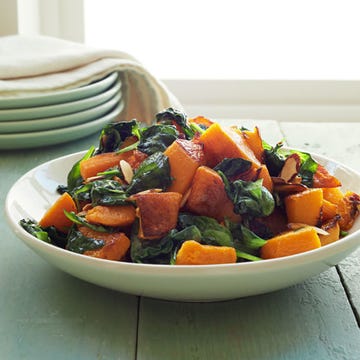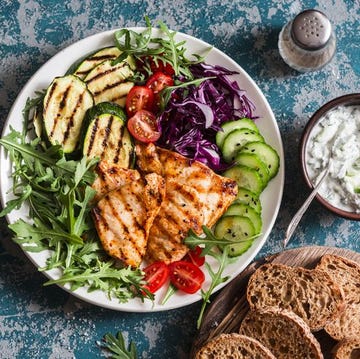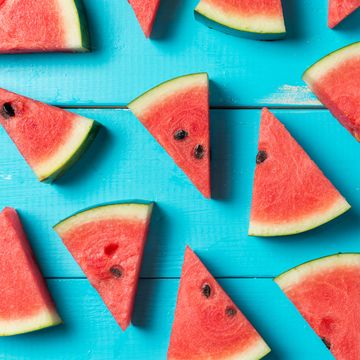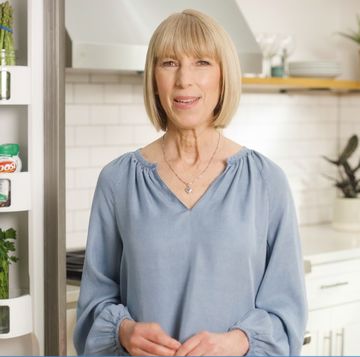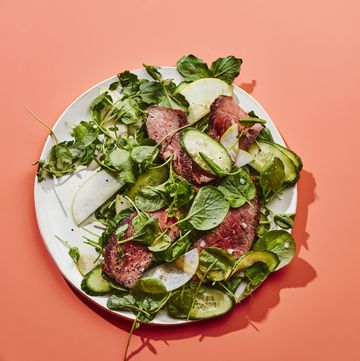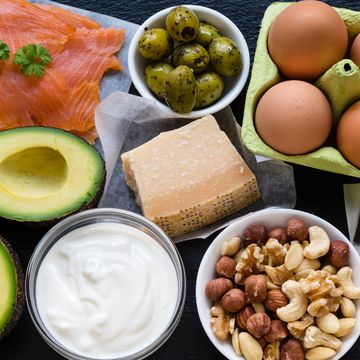As a new parent, your focus will of course fall singularly on your baby. That doesn't mean you should forget the big lesson from every pre-flight safety demo, though: You have to focus on your own health before you can help the health of others around you.
“It’s important that breastfeeding mothers take care of themselves by eating nutritious foods, staying hydrated, and resting when possible so they can have more energy and stay healthy,” says Michelle Ross, RD, LD, ALC, registered and licensed dietitian and advanced lactation consultant, and the program manager for Clinical Nutrition and Lactation at Nationwide Children's Hospital.
Beyond giving you enough energy to change diapers and stay awake for those late-night cries, your body has some other magic to do during this special time.
“What’s extremely interesting about breast milk is that it is dynamic. Depending on what baby needs, the mother’s body is able to change the composition to meet their baby’s need,” Ross continues.
How can you maximize your own eating, so you can pass on good food to your baby? Here's some advice from doctors, dietitians, and nurses about exactly how much and what to eat while breastfeeding.
How Much (More) to Eat
On average, breastfeeding moms should consume about 300 to 500 additional calories each day, compared to what was consumed prior to pregnancy.
Using the MyPlate food plan calculator, a slightly active 30-year-old mom who’s 140 pounds and 5-foot 4-inches would require around 2,200 calories per day if she's only breastfeeding her baby. If she's giving a mix of breast milk and formula around 2,000 calories per day are recommended.
Make those calories quality, suggests Jyothi Parapurath, MD, an ob-gyn at CareMount Medical in Carmel, New York. “Breastfeeding mothers should focus on building a healthy diet. They do need more calories than non-breastfeeding mothers,” she says.
What to Eat
Remember: What you feed yourself is what you’re feeding your little one. “To promote milk production, aim for a well-rounded diet rich in fruits, vegetables, whole grains, dairy, protein, and healthy fats,” says Lisa Lewis, MD, a pediatrician in Fort Worth, Texas. “Healthful foods ingested are passed directly from the mother to the breastfeeding baby.”
Take special note of the protein factor, Lewis says, since “studies have shown that increasing protein in the diet of a breastfeeding mother will increase the production of milk.”
In those categories, aim for variety and seek out the following options, when available. All include vitamins and nutrients (such as calcium, iron, omega-3s, potassium, vitamin A and vitamin C) that are recommended for expecting and breastfeeding moms.
Fruits
- Apricots
- Bananas
- Citrus fruits
- Mangoes
- Melon
Vegetables
- Carrots
- Leafy greens
- Tomatoes
- Sweet potatoes
- Winter squash
Whole grains
- Barley
- Fortified, low-sugar, whole-grain cereals
- Oats
- Quinoa
- Whole-wheat bread
Dairy
- Fortified milk substitutes
- Milk
- Regular yogurt
- Greek yogurt
- Kefir
Protein
- Beans
- Chicken
- Lean beef
- Pork
- Salmon
Healthy Fats
- Avocados
- Chia seeds
- Grape seed oil
- Nuts
- Olive oil
If you don't eat meat generally, “take a multivitamin that includes Vitamin B12,” Parapurath says. B12 can be transferred through the placenta during gestation and the breast milk after delivery, and if mom doesn’t have enough and doesn’t supplement with fortified formula, baby can become deficient, too, Centers for Disease Control (CDC) experts claim.
Drink a glass of water each time you breastfeed or pump to keep your cells hydrated.
What to Avoid Eating
Certain “never eat while breastfeeding!” suggestions are simply old wives tales. Spicy dishes and gassy foods (such as broccoli or cauliflower) are often avoided, but are actually A-OK to enjoy, per Korean research. Caffeine only becomes problematic when consumed in large quantities — like five cups of coffee or more a day.
“Sometimes babies can react to certain foods because the taste of the breast milk changes,” says Kelley Baumgartel, PhD, RN, a registered nurse and an assistant professor at the School of Nursing at Duquesne University in Pittsburgh, Pennsylvania.
While baby noticing a different flavor isn’t necessarily bad, keep a keen eye on her reactions to common allergens such as dairy or wheat. Breathing issues, diarrhea, and skin irritation or changes are certainly worth speaking to your pediatrician about.
In general, “the list of foods to avoid for breastfeeding mothers is very similar to the list of foods that are shunned in pregnancy,” Lewis says.
It’s best to skip:
- Raw/undercooked meat and seafood
- Fish with high level of mercury
- Alcohol, if not pumping and discarding for the next 12 hours
- Beverages sweetened with high fructose corn syrup
As always, though, these guidelines are no substitute for medical care. Chat about your diet and your baby's diet with your doctor, and be sure to bring up any and all concerns with a professional.
Karla Walsh is a Des Moines, Iowa-based freelance writer and level one sommelier who balances her love of food and drink with her passion for fitness. (Or tries to, at least!) Her writing has been published in Runner’s World and Fitness Magazines, as well as on Shape.com, EatThis.com, WomensHealthMag.com, and more.


